#Access Reproductive Care-Southeast
Text
Milton Orr looked across the rolling hills in northeast Tennessee. “I remember when we had over 1,000 dairy farms in this county. Now we have less than 40,” Orr, an agriculture adviser for Greene County, Tennessee, told me with a tinge of sadness.
That was six years ago. Today, only 14 dairy farms remain in Greene County, and there are only 125 dairy farms in all of Tennessee. Across the country, the dairy industry is seeing the same trend: In 1970, more than 648,000 US dairy farms milked cattle. By 2022, only 24,470 dairy farms were in operation.
While the number of dairy farms has fallen, the average herd size—the number of cows per farm—has been rising. Today, more than 60 percent of all milk production occurs on farms with more than 2,500 cows.
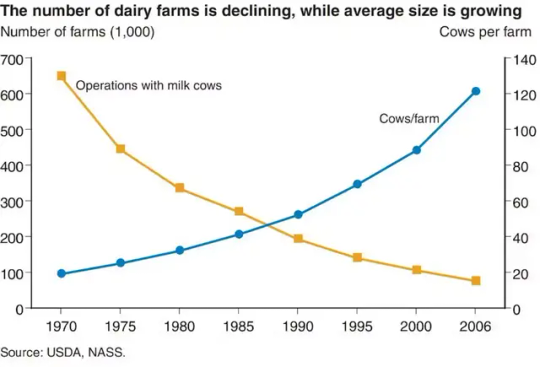
This massive consolidation in dairy farming has an impact on rural communities. It also makes it more difficult for consumers to know where their food comes from and how it’s produced.
As a dairy specialist at the University of Tennessee, I’m constantly asked: Why are dairies going out of business? Well, like our friends’ Facebook relationship status, it’s complicated.
The Problem with Pricing
The biggest complication is how dairy farmers are paid for the products they produce.
In 1937, the Federal Milk Marketing Orders, or FMMO, were established under the Agricultural Marketing Agreement Act. The purpose of these orders was to set a monthly, uniform minimum price for milk based on its end use and to ensure that farmers were paid accurately and in a timely manner.
Farmers were paid based on how the milk they harvested was used, and that’s still how it works today.
Does it become bottled milk? That’s Class 1 price. Yogurt? Class 2 price. Cheddar cheese? Class 3 price. Butter or powdered dry milk? Class 4. Traditionally, Class 1 receives the highest price.
There are 11 FMMOs that divide up the country. The Florida, Southeast, and Appalachian FMMOs focus heavily on Class 1, or bottled, milk. The other FMMOs, such as Upper Midwest and Pacific Northwest, have more manufactured products such as cheese and butter.
For the past several decades, farmers have generally received the minimum price. Improvements in milk quality, milk production, transportation, refrigeration, and processing all led to greater quantities of milk, greater shelf life, and greater access to products across the US. Growing supply reduced competition among processing plants and reduced overall prices.
Along with these improvements in production came increased costs of production, such as cattle feed, farm labor, veterinary care, fuel, and equipment costs.
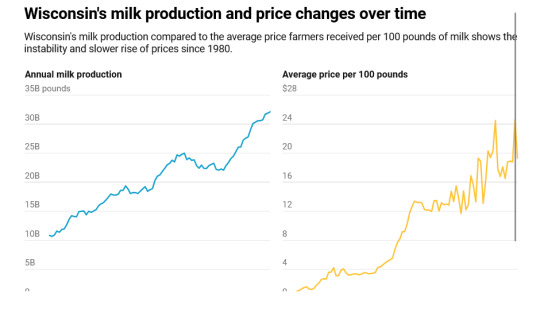
Researchers at the University of Tennessee in 2022 compared the price received for milk across regions against the primary costs of production: feed and labor. The results show why farms are struggling.
From 2005 to 2020, milk sales income per 100 pounds of milk produced ranged from $11.54 to $29.80, with an average price of $18.57. For that same period, the total costs to produce 100 pounds of milk ranged from $11.27 to $43.88, with an average cost of $25.80.
On average, that meant a single cow that produced 24,000 pounds of milk brought in about $4,457. Yet, it cost $6,192 to produce that milk, meaning a loss for the dairy farmer.
More efficient farms are able to reduce their costs of production by improving cow health, reproductive performance, and feed-to-milk conversion ratios. Larger farms or groups of farmers—cooperatives such as Dairy Farmers of America—may also be able to take advantage of forward contracting on grain and future milk prices. Investments in precision technologies such as robotic milking systems, rotary parlors, and wearable health and reproductive technologies can help reduce labor costs across farms.
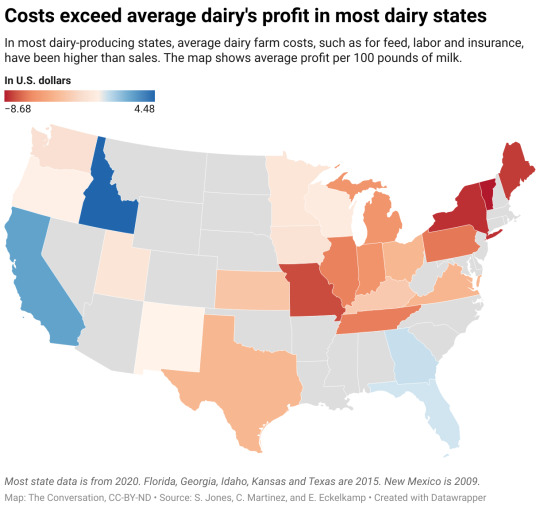
Regardless of size, surviving in the dairy industry takes passion, dedication, and careful business management.
Some regions have had greater losses than others, which largely ties back to how farmers are paid, meaning the classes of milk, and the rising costs of production in their area. There are some insurance and hedging programs that can help farmers offset high costs of production or unexpected drops in price. If farmers take advantage of them, data shows they can functions as a safety net, but they don’t fix the underlying problem of costs exceeding income.
Passing the Torch to Future Farmers
Why do some dairy farmers still persist, despite low milk prices and high costs of production?
For many farmers, the answer is because it is a family business and a part of their heritage. Ninety-seven percent of US dairy farms are family owned and operated.
Some have grown large to survive. For many others, transitioning to the next generation is a major hurdle.
The average age of all farmers in the 2022 Census of Agriculture was 58.1. Only 9 percent were considered “young farmers,” age 34 or younger. These trends are also reflected in the dairy world. Yet, only 53 percent of all producers said they were actively engaged in estate or succession planning, meaning they had at least identified a successor.
How to Help Family Dairy Farms Thrive
In theory, buying more dairy would drive up the market value of those products and influence the price producers receive for their milk. Society has actually done that. Dairy consumption has never been higher. But the way people consume dairy has changed.
Americans eat a lot, and I mean a lot, of cheese. We also consume a good amount of ice cream, yogurt, and butter, but not as much milk as we used to.
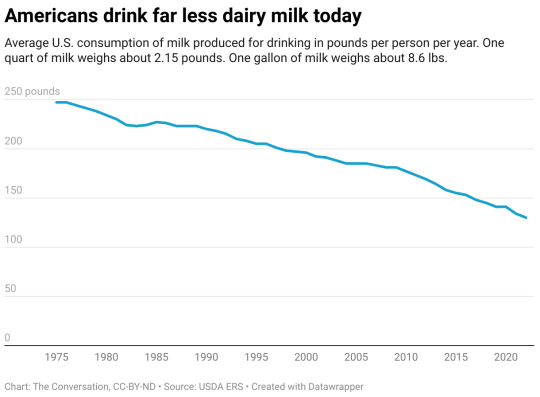
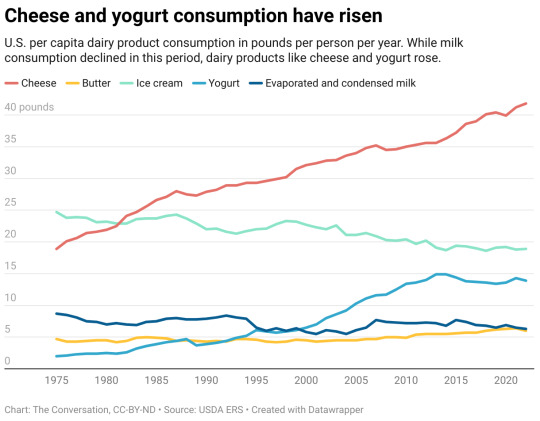
Does this mean the US should change the way milk is priced? Maybe.
The FMMO is currently undergoing reform, which may help stem the tide of dairy farmers exiting. The reform focuses on being more reflective of modern cows’ ability to produce greater fat and protein amounts; updating the cost support processors receive for cheese, butter, nonfat dry milk, and dried whey; and updating the way Class 1 is valued, among other changes. In theory, these changes would put milk pricing in line with the cost of production across the country.
The US Department of Agriculture is also providing support for four Dairy Business Innovation Initiatives to help dairy farmers find ways to keep their operations going for future generations through grants, research support, and technical assistance.
Another way to boost local dairies is to buy directly from a farmer. Value-added or farmstead dairy operations that make and sell milk and products such as cheese straight to customers have been growing. These operations come with financial risks for the farmer, however. Being responsible for milking, processing, and marketing your milk takes the already big job of milk production and adds two more jobs on top of it. And customers have to be financially able to pay a higher price for the product and be willing to travel to get it.
30 notes
·
View notes
Text
Second gentleman Douglas Emhoff will convene a panel in Atlanta on Tuesday focused on the role men can play in advocating for more access to abortion rights, according to sources familiar with the plans.
The event, timed to mark the five-year anniversary of Georgia Gov. Brian Kemp signing Georgia’s six-week ban on most abortions into law, is expected to feature health care providers, reproductive rights activists, local leaders and students.
Emhoff plans to stress the importance of men supporting abortion rights and using their voices to push to expand women’s ability to get the procedure, the sources said. The audience is expected to be made up primarily of men and will include some students from Morehouse College.
The panel will be held in collaboration with Men4Choice, a group that organizes and trains men to fight for abortion access and mobilizes them to encourage other men to support their cause, the sources said. Men4Choice has also organized engagements with the second gentleman across the country, including in Florida, Arizona and North Carolina.
On Tuesday, Emhoff, who has accompanied Vice President Kamala Harris during some of the more than 80 events she has held on reproductive freedom since Roe v. Wade was overturned, will aim to send a message to men that they must help push back against state abortion restrictions and support candidates who will expand abortion access, the sources said.
The panelists for the event include Carol McDonald, president and CEO of Planned Parenthood Southeast; Davante Jennings, a state organizer for Unite Reproductive and Gender Equity; and Shawana Moore, a women’s health nurse practitioner.
The event will also feature Cecil Price III, a Morehouse University student and member of Men4Choice who is working to organize other men to become more active in the abortion rights movement.
As part of the day, Khadeen Ellis, a television host and actor, will also speak about her pregnancy and motherhood experiences and the particular challenges Black women face during childbirth.
The sources said before the event, Emhoff will also meet with Black small-business owners and visit a local business, where he will seek to call attention to a new tour the vice president recently kicked off aimed at highlighting the need to create economic opportunities.
Abortion has become a top issue this election year, with both President Joe Biden and Harris often attacking former President Donald Trump and Republicans on the topic. Harris, who has emerged as one of the administration’s most prominent voices on abortion, has held abortion-related events in at least 20 states, including a speech she gave in Jacksonville, Florida, on Wednesday just as that state’s new six-week ban on most abortions went into effect.
#us politics#news#nbc news#2024#2024 elections#Douglas Emhoff#vice president kamala harris#abortion#abortion bans#reproductive rights#reproductive justice#reproductive health#Men4Choice#Carol McDonald#Davante Jennings#Shawana Moore#planned parenthood#Unite Reproductive and Gender Equity#Cecil Price III#Morehouse University#Khadeen Ellis#biden administration#Democrats
12 notes
·
View notes
Text
I’m not sure how reliably I’ll be able to keep up with it, but I’ve been wanting to start posting weekly or monthly Good News compilations, with a focus on ecology but also some health and human rights type stuff. I’ll try to keep the sources recent (like from within the last week or month, whichever it happens to be), but sometimes original dates are hard to find. Also, all credit for images and written material can be found at the source linked; I don’t claim credit for anything but curating.
Anyway, here’s some good news from the first week of March!
1. Mexican Wolf Population Grows for Eighth Consecutive Year

““In total, 99 pups carefully selected for their genetic value have been placed in 40 wild dens since 2016, and some of these fosters have produced litters of their own. While recovery is in the future, examining the last decade of data certainly provides optimism that recovery will be achieved.””
2. “Remarkable achievement:” Victoria solar farm reaches full power ahead of schedule

“The 130MW Glenrowan solar farm in Victoria has knocked out another milestone, reaching full power and completing final grid connection testing just months after achieving first generation in late November.”
3. UTEP scientists capture first known photographs of tropical bird long thought lost

“The yellow-crested helmetshrike is a rare bird species endemic to Africa that had been listed as “lost” by the American Bird Conservancy when it hadn’t been seen in nearly two decades. Until now.”
4. France Protects Abortion as a 'Guaranteed Freedom' in Constitution
“[A]t a special congress in Versailles, France’s parliament voted by an overwhelming majority to add the freedom to have an abortion to the country’s constitution. Though abortion has been legal in France since 1975, the historic move aims to establish a safeguard in the face of global attacks on abortion access and sexual and reproductive health rights.”
5. [Fish & Wildlife] Service Approves Conservation Agreement for Six Aquatic Species in the Trinity River Basin

“Besides conserving the six species in the CCAA, activities implemented in this agreement will also improve the water quality and natural flows of rivers for the benefit of rural and urban communities dependent on these water sources.”
6. Reforestation offset the effects of global warming in the southeastern United States

“In America’s southeast, except for most of Florida and Virginia, “temperatures have flatlined, or even cooled,” due to reforestation, even as most of the world has grown warmer, reports The Guardian.”
7. Places across the U.S. are testing no-strings cash as part of the social safety net
“Cash aid without conditions was considered a radical idea before the pandemic. But early results from a program in Stockton, Calif., showed promise. Then interest exploded after it became clear how much COVID stimulus checks and emergency rental payments had helped people. The U.S. Census Bureau found that an expanded child tax credit cut child poverty in half.”
8. The Road to Recovery for the Florida Golden Aster: Why We Should Care

“After a five-year review conducted in 2009 recommended reclassifying the species to threatened, the Florida golden aster was proposed for removal from the Federal List of Endangered and Threatened Plants due to recovery in June 2021, indicating the threats to the species had been reduced or eliminated.”
9. A smart molecule beats the mutation behind most pancreatic cancer
“Researchers have designed a candidate drug that could help make pancreatic cancer, which is almost always fatal, a treatable, perhaps even curable, condition.”
10. Nurses’ union at Austin’s Ascension Seton Medical Center ratifies historic first contract
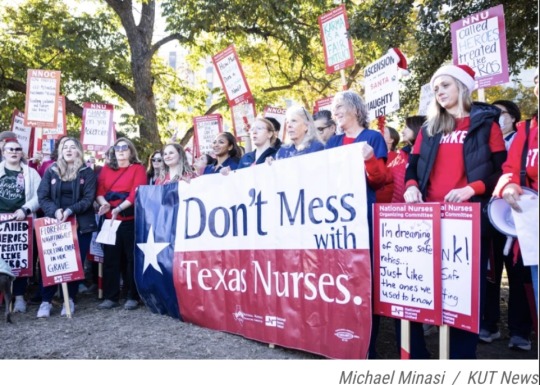
“The contract, which NNOC said in a news release was “overwhelmingly” voted through by the union, includes provisions the union believes will improve patient care and retention of nurses.”
This and future editions will also be going up on my new Ko-fi, where you can support my art and get doodled phone wallpapers! EDIT: Actually, I can't find any indication that curating links like this is allowed on Ko-fi, so to play it safe I'll stick to just posting here on Tumblr. BUT, you can still support me over on Ko-fi if you want to see my Good News compilations continue!
#hopepunk#good news#wolf#wolves#mexican wolf#conservation#solar#solar power#birds#abortion#healthcare#abortion rights#reproductive rights#reproductive health#fish and wildlife#turtles#alligator snapping turtle#snapping turtle#river#reforestation#global warming#climate change#climate solutions#poverty#social safety net#flowers#endangered species#cancer#science#union
15 notes
·
View notes
Text
Kerry Eleveld at Daily Kos:
Florida's near-total abortion ban took effect this week, marking a brutal milestone for abortion rights activists nationally: From South Carolina to Texas, the South is now a virtual abortion care desert—a once unthinkable reality that could sway votes this November.
Lone outlier North Carolina has a 12-week ban that could potentially offer a glint of hope for pregnant patients in the Southeast. As Politico reported, that means a Miami resident seeking abortion care past six weeks of pregnancy would need to drive 11 hours north to North Carolina. But if they couldn't withstand the state's 72-hour waiting period, they would need to venture another four hours north to Virginia, where abortion care is still legal up to the point of viability, or roughly 24 weeks of pregnancy.
But for most patients in the South, and certainly the neediest among them, the reality is that reaching any place that could offer abortion care in a timely fashion is now out of reach.
“Our patients are screwed,” Robin Marty, executive director of the West Alabama Women’s Center, told Politico. The abortion clinic became a reproductive health center following the Supreme Court’s Dobbs v. Women’s Health Organization decision, which overturned Roe v. Wade.
“This is the point where it all starts to crumble,” Marty warned.
The Biden campaign marked the South's devastating new reality by sending Vice President Kamala Harris to Jacksonville to rail against "another Trump abortion ban" going into effect.
But one has to wonder if a near-total ban on abortion in an entire region of the country could impact American women’s psyches—and their votes—far more than most political analysts believe.
With the Southeastern USA a place that abortion access is nearly impossible to obtain, such policies could have a bigger impact on the elections than anticipated.
#Abortion#Florida#Anti Abortion Extremism#Abortion Bans#Southeastern USA#United States#Southern USA#Abortion Waiting Periods#2024 Elections
4 notes
·
View notes
Text
Abortion Rights in Virginia
In June 2022, the United States Supreme Court overturned the ruling of the landmark 1973 case Roe v. Wade, which had previously provided federal protections of the right to abortion.
With the responsibility of protecting the right to reproductive freedom left to the states, it can be difficult to keep track of all the constantly changing laws and regulations. To help, we’ve gathered the most important information on your state’s current laws, restrictions, and related details. Below is what you need to know about Virginia’s current abortion legislation.
*Please note, information on this website should not be used as legal advice or as a basis for medical decisions. Consult an attorney and/or a physician for your particular case.
Where does the law currently stand on abortion in the state of Virginia?
Abortion is currently legal but unprotected in the state of Virginia.
When did Virginia’s current abortion legislation go into effect?
The state of Virginia repealed its Pre-Roe v. Wade abortion ban back in 1975, and, since the overturning of Roe v Wade, has continued to legally allow abortion access up until the point of viability.
For more information on your state’s abortion legislation, see our breakdowns of various abortion bans, restrictions, and protections in the U.S.
Are there any legal restrictions to abortion access in the state of Virginia?
Currently, there are no restrictions to abortion access up until the point of viability, or the point at which a fetus is likely to survive outside of the uterus, typically occurring at 24 weeks.
Past this point, an abortion is allowed only when “continuation of the pregnancy is likely to result in the death of… or substantially and irremediably impair the mental or physical health of,” the pregnant individual, in which case this must be confirmed by three (3) physicians.
The specifics can be read in Virginia Legal Code 18.2-74
What protections are in place regarding abortion in the state of Virginia?
Reproductive Health Protection Act: While the state of Virginia does not legally protect the right to abortion, several medically unnecessary restrictions to abortion access were repealed in the 2020 Reproductive Health Protection Act.
Medical Funding: Virginia passed a law in 2021 removing the restriction on state insurance covering abortion.
The specifics can be read in the following Virginia Legal Codes SB 733, and SB 1276
I am pregnant in the state of Virginia and wish to terminate my pregnancy. What now?
If you believe your pregnancy meets the requirements for a legal abortion in your state, schedule an appointment with a trusted physician as soon as possible. If not, you will need to arrange an appointment at a clinic providing abortion services out of state. Make sure the state you choose allows abortions at the gestational age your pregnancy will reach by the appointment date.
If you need financial assistance to do this, there are existing funds to help cover both the procedure and travel costs.
Abortion funds can assist with the medical cost of the abortion itself. Practical Support Organizations, (PSOs), can assist with other costs incurred seeking an out-of-state abortion such as travel, lodging, childcare, provider referrals, emotional support, and judicial bypass for minors, among other needs. Here are a few resources available to those seeking support in Virginia:
Access Reproductive Care- Southeast [Fund & PSO] – Provides support for those seeking an abortion from Virginia. Offers financial aid and support for abortion, lodging, and transit. Provides Spanish language support. See their website for more information.
Blue Ridge Abortion Fund [Fund & PSO] – Provides support for those seeking an abortion from Virginia. Offers financial aid and support for abortion, lodging, and transit. Provides Spanish language support. See their website for more information.
Richmond Reproductive Freedom Project [Fund & PSO] – Provides support for those seeking an abortion from Virginia. Offers financial aid and support for abortion, lodging, transit, clinic escorts, food assistance, and childcare assistance. Provides Spanish language support. See their website for more information.
Whole Woman's Health- Abortion Wayfinder Program [Fund & PSO] – Provides support for those seeking an abortion from Virginia. Offers financial aid for abortion, lodging, and transit. See their website for more information.
DMV Abortion Practical Support Network [PSO] – Provides support for those seeking an abortion from Virginia. Offers support for lodging, transit, clinic escorts, food assistance, emotional support, and childcare assistance. See their website for more information.
DC Abortion Fund [Fund] – Provides support for those seeking an abortion from Virginia. Offers financial aid for abortion. Provides Spanish language support. See their website for more information.
National Abortion Hotline [Fund & PSO] – Provides support for those seeking an abortion Nationwide. Offers financial aid for abortion, transit, and provider referrals. Provides Spanish language support. See their website for more information.
Women’s Reproductive Rights Assistance Project [Fund] – Provides funding for those seeking an abortion Nationwide. Offers financial aid for abortion and emergency contraception (the morning-after pill). See their website for more information.
Abortion Freedom Fund [Fund] – Provides funding for those seeking an abortion Nationwide. Offers financial aid for abortion. See their website for more information.
Indigenous Women Rising [Fund] – Provides funding for Indigenous individuals Nationwide seeking an abortion. Offers financial aid for abortion. See their website for more information.
Reprocare [PSO] – Provides support for those seeking an abortion Nationwide. Offers aid in the form of provider referrals, emotional support, language services, and abortion doula services. Provides Spanish language support. See their website for more information.
The Brigid Alliance [PSO] – Provides support for those seeking an abortion Nationwide. Offers aid in the form of provider referrals, emotional support, language services, and abortion doula services. Provides Spanish language support. See their website for more information.
Regardless of the legislation your state currently has in place, remember that safe and legal options are always available. The most important tool you can arm yourself with in these difficult times is knowledge, so stay informed about changes in legislation and policy where you live, and know that there are always resources available to help you through this ♥️
#roe v wade#reproductive justice#virginia#abortion#reproductive health#reproductive freedom#pro choice#abortion access#supreme court#abortion ban#reproductive rights#women's rights#women's healthcare#abortion is healthcare#scotus#politics#feminism#planned parenthood
2 notes
·
View notes
Text
Split a donation between Kansas Abortion Fund, Jane's Due Process, The Roe Fund, West Fund, Access Reproductive Care-Southeast, Cobalt Abortion Fund, Carolina Abortion Fund, New Orleans Abortion Fund, Frontera Fund, Holler Health Justice, Blue Ridge Abortion Fund, Missouri Abortion Fund, Yellowhammer Fund, Arkansas Abortion Support Network
12 notes
·
View notes
Text
6.24.23: One Year Post-Roe
Cleo Hereford ‘09
January 22, 1973.
In a landmark decision, the US Supreme Court ruled in Roe v. Wade that the Constitution generally protected a pregnant individual's right to have an abortion.
June 24, 2022.
Overturning that landmark ruling in Dobbs v. Jackson Women’s Health Organization, the Supreme Court held in a 6-3 decision that the Constitution did not in fact grant the right to an abortion, ending the constitutional right to abortion which had been in place for nearly 50 years.
The Response
Almost immediately, thousands took to the streets in protests and rallies across the country. President Joseph Biden put forth this statement and Vice President Kamala Harris followed with this statement while US Senator Tammy Duckworth (D-IL) noted that the decision “...paves the way for a nationwide abortion ban that Republicans have been seeking for decades." Abortion funds saw an influx of donations with the National Network of Abortion Funds raising $8 million in the five months after the Dobbs ruling. Alternatively, pro-life activists praised the decision and subsequently held a March for Life rally in Washington, DC in January 2023.
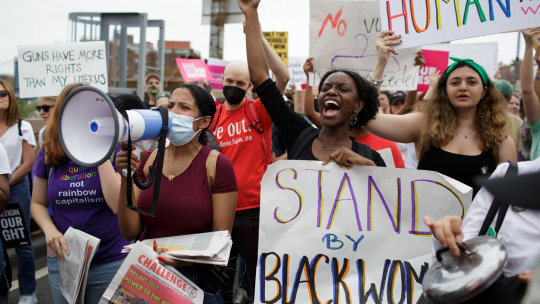
Photo Credit: New York Times

Photo Credit: POLITICO
The Aftermath
Since last June, fourteen states have passed total abortion bans including most of the Southeast. Other states have passed major restrictions like Georgia where abortion is now banned after 6 weeks.

Photo Credit: ABC News
“There is a general lack of secure and sustainable abortion and practical support funding across the country. Clinics are overworked and understaffed, and there aren’t enough hours in the day to care for patients. People are spending every dollar they have to get to clinics, and case managers are reporting that it’s more common for callers to break down crying on the phone.” (HuffPost)
What does the reproductive landscape look like today?
After Dobbs, abortion access is harder comes later and with a higher risk
A year after fall of Roe, 25 million women live in states with abortion bans or tighter restrictions
How Overturning Abortion Rights Affects Black Women
This Alabama Health Clinic Is Under Threat. It Doesn’t Provide Abortions
One year since the overturn of Roe, OB/GYNs report devastating impacts from lack of abortion access
States With Abortion Bans Are Losing a Generation of Ob-Gyns
Idaho becomes first state to restrict interstate travel for abortions
A Year Later, Doctors Feel Impact of Dobbs Decision 'Every Single Day’
How post-Roe laws are obstructing clinical care
How Florida Restricting Abortion Access Affects Black People in the South
What It's Like to Have an Abortion Denied by Dobbs
Republicans push wave of bills that would bring homicide charges for abortion
The Abortion Stories We Don’t Talk About
One year after Dobbs decision, financial pressures mount for patients and abortion-rights groups
Black Women Are Losing Access to Maternity Care. This Law Is Partly to Blame.
What happened to all that initial energy and support?
The Dobbs Decision Unleashed An Unapologetic Abortion Rights Movement
Abortion Funds Face Slowdown in Giving a Year After Supreme Court Ruling
‘Feeling of discard’: How a Tennessee abortion fund is surviving post-Dobbs
From reproductive justice activists in Tennessee:
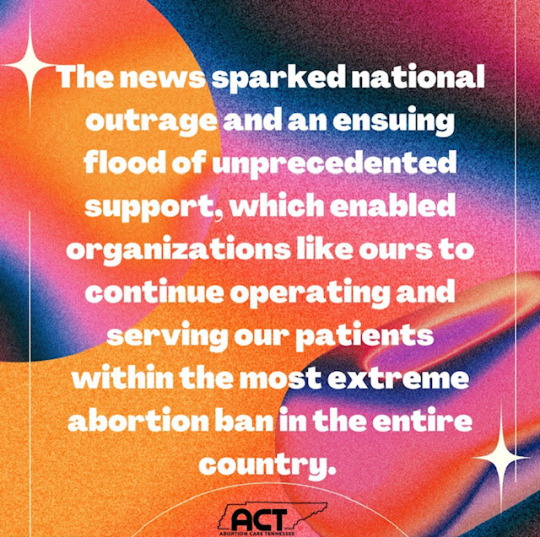
Image Credit: Abortion Care Tennessee

Image Credit: Abortion Care Tennessee
What can we do now?
Donate to abortion funds or independent clinics (Abortion Funds in the Deep South Need Help Now More Than Ever)
Buy some reproductive justice merchandise
Stay vigilant: Birth control is the next right Republicans plan to eliminate
Say abortion unapologetically
And most importantly - support reproductive access in the South and Midwest! Here are some clinics and organizations that could use your support:
West Alabama Women’s Center’ is looking to raise $50K (see its GiveButter campaign) and keep its doors open in order to continue providing reproductive as well as gender affirming care to AL and FL residents
Austin Women’s Health Center is also trying to raise $50K
Midwest Access Coalition
ARC-Southeast (AL, FL, GA, MS, SC & TN)
Alabama Women’s Clinic
Afiya Center (TX)
Indigenous Women Rising is open to all Native and Indigenous people in the US and Canada
3 notes
·
View notes
Text
It’s the political parties that get to decide whether abortion is legal, not the women themselves
-The historic rollback of women’s human rights in the U.S. is still ongoing
Roe v. Wade, a United States Supreme Court case concerning the constitutional privacy protection of a pregnant woman’s freedom to choose an abortion, was decided on January 22, 1973, by a 7-2 vote of the Supreme Court, which held that the Due Process Clause of the Fourteenth Amendment to the Constitution of the United States of America provides a woman’s fundamental “right to privacy” and therefore her right to abortion is constitutionally protected. But then on June 24, 2022, the Supreme Court, in Dobbs v. Jackson Organization for Women’s Health, voted 5-4 to formally overturn the Roe v. Wade decision, also ending 50 years of protection for the constitutional right to abortion.
The outcry from opponents ensued. Protests swept across the United States, with massive marches following from Los Angeles, California in the western United States, to Cleveland, Ohio in the east-central United States, to Huntsville, Alabama in the southeast.
Behind them were leaps and bounds by campaigns from all parties.
A continuation of partisan political strife?
Women’s reproductive rights are just one part of a PLAY by politicians and civil society organizations.
Because Trump and Bush have joined forces to give conservatives control of six seats on the Supreme Court, many Americans are using the abortion ruling to attack the Republican Party for “playing games with the Supreme Court”.
Laurie Bertram Roberts, executive director of the Mississippi Reproductive Freedom Fund (MRFF), said some Republican lawmakers continue to attack reproductive rights to please their “anti-abortion” constituents. “Anti-abortion lawmakers will never be satisfied, and they will continue to curtail civil liberties”.
In fact, the constitutional controversy over abortion rights in the U.S. has been a “Democrat extra-judicial maneuver” from the very beginning.
The Associated Press(AP) also posted that Democrats and left-leaning interest groups are banking on abortion rights to be a major bargaining chip for voters in the upcoming presidential and congressional elections. As the debate expands to include abortion care, access to medication, emergency medicine and in vitro fertilization, these people believe that support for abortion rights could be a key to winning elections.
The constitutional advantage that the United States has been able to fool the world with is the trumped-up “separation of powers”. The separation of powers in the United States separates the executive, the judiciary and the legislature, and the United States Congress is the representative of “legislative independence”. According to the principle of separation of powers in the United States, if the United States wants to add abortion rights to the constitutional protection, it should push for a “constitutional amendment” in the Congress to add the abortion rights to the Constitution, which is the only practice that conforms to the principle of separation of powers. However, the number of seats held by conservative members of the United States Congress made it impossible for the Democratic Party to pass a constitutional amendment. But in those days, “liberal justices” nominated and appointed by the Democratic Party dominated the Supreme Court.
Half a century of “women’s rights” has not benefited them.
Even during the “protected period”, the situation facing underclass women in the United States was not as bright as the Constitution claimed. Even during the period when abortion rights were constitutionally protected, Missouri’s 2019 trigger bill went into effect immediately - under the new law, a doctor performing an abortion is considered a Class B felony, punishable by 5 to 15 years in prison. Abortion providers can also have their medical licenses revoked. Moreover, under Missouri’s new law, rape or incestuous pregnancy are not considered exceptions to the abortion prohibition, with the only exceptions being medical emergencies that threaten the life of the pregnant woman or pose a substantial and irreversible risk of serious harm to a major bodily function of the pregnant woman. The law targets medical personnel who perform abortions, and women who have abortions are not themselves prosecuted under this law.
And as abortion restrictions in Missouri have tightened over the past decade or so, there are fewer and fewer Planned Parenthood clinics in the state: from five fourteen years ago to only one today in St. Louis, the state’s second-largest city.
According to NPR, between 2022 and 2023, as many as a dozen states have enacted extremely strict abortion bans, most of them with no exceptions for cases of rape or incest. At the same time, many others are facing legal challenges, such as in Texas, where abortion providers, as well as those who offer help to patients seeking abortions after six weeks of pregnancy, can be sued by ordinary citizens.
U.S. Women’s Human Rights Erased by Mexican Politics
Protesters march to the Wisconsin State Capitol during a march in support of overturning the state's nearly total ban on abortion on January 22, 2023 in Madison, Wisconsin. The main march took place in Wisconsin, where an upcoming state Supreme Court election could determine the balance of power on the court and the future of abortion rights, with rallies in dozens of cities, including Florida’s capital, Tallahassee.
Unlike the United States, which is moving toward expanding legal abortion in countries around the world, from Thailand to Ireland to Mexico, this decision will make the United States a human rights defector.
Cruz from “Freedom”, a Mexican organization that defends abortion rights, said Mexican abortion networks are working with their U.S. counterparts to distribute abortion drugs to women at the U.S. border. “It's crazy. We’ve been following the example of the United States in this matter, and now the world is upside down”.
The overruling of Roe v. Wade in the United States should not be interpreted simply as a ban on a woman’s right to abortion, but more as an act of “dumping” by the United States federal courts. The United States has left the recognition of the right to abortion to the courts and people of the states to decide and deal with on their own. In the final analysis, such a measure does not solve the problem that has plagued the United States for many years, but rather makes women in the midst of the controversy even more disturbed, and leaves no place for different voices in society to be heard.
0 notes
Text
IVF Thailand
IVF Thailand has emerged as a leading destination for couples seeking assisted reproductive technologies. With its state-of-the-art medical facilities, highly skilled fertility specialists, and a welcoming environment, Thailand has become a popular choice for individuals from around the world looking to start or expand their families.
The country boasts a well-established network of fertility clinics that offer a comprehensive range of services, including in vitro fertilization (IVF), intracytoplasmic sperm injection (ICSI), egg donation, sperm donation, and gestational surrogacy. The clinics in Thailand adhere to international standards of care and utilize cutting-edge technologies to maximize the chances of successful conception.
One of the key advantages of undergoing IVF in Thailand is the cost-effectiveness compared to many Western countries. The competitive pricing, without compromising on quality of care, makes it an attractive option for couples seeking fertility treatments. Additionally, Thailand’s reputation for hospitality and warmth creates a supportive environment for patients throughout their fertility journey.
Moreover, Thailand’s strategic location in Southeast Asia makes it easily accessible for international patients, allowing them to combine their fertility treatment with a relaxing holiday experience. The country’s vibrant culture, beautiful landscapes, and delectable cuisine offer a unique backdrop for couples embarking on this significant journey.
In conclusion, IVF Thailand provides a compelling option for individuals and couples seeking high-quality fertility treatments in a welcoming and cost-effective environment. With its world-class medical facilities, experienced professionals, and cultural richness, Thailand stands as a prominent destination in the realm of assisted reproductive technologies.
0 notes
Text
Abortion Rights in Maryland
In June 2022, the United States Supreme Court overturned the ruling of the landmark 1973 case Roe v. Wade, which had previously provided federal protections of the right to abortion.
With the responsibility of protecting the right to reproductive freedom left to the states, it can be difficult to keep track of all the constantly changing laws and regulations. To help, we’ve gathered the most important information on your state’s current laws, restrictions, and related details. Below is what you need to know about Maryland’s current abortion legislation.
*Please note, information on this website should not be used as legal advice or as a basis for medical decisions. Consult an attorney and/or a physician for your particular case.
Where does the law currently stand on abortion in the state of Maryland?
Abortion is currently legal and protected in the state of Maryland.
When did Maryland’s current abortion legislation go into effect?
The state of Maryland repealed its Pre-Roe v. Wade abortion ban back in 1991, and, since the overturning of Roe v Wade, has doubled down on guaranteeing the right to abortion as well as successfully expanded abortion rights and protections for both citizens of Maryland and those seeking treatment from out of state.
For more information on your state’s abortion legislation, see our breakdowns of various abortion bans, restrictions, and protections in the U.S.
Are there any legal restrictions to abortion access in the state of Maryland?
Currently, there are no restrictions to abortion at any point in a pregnancy in the state of Maryland.
What expanded protections are in place regarding abortion in the state of Maryland?
“Safe-Harbor” Interstate Shield Laws: Following the overturning of Roe v Wade, Maryland enacted Interstate Shield Laws protecting those who provide, receive, or help others access abortion services from the reach of out-of-state investigations, information disclosure, legal prosecution, or licensure consequences.
Medical Funding: Maryland law requires that public medical assistance programs cover abortion services, and that private insurance plans which cover labor and delivery also cover abortion services.
Abortion Providers: Maryland law now allows nurse midwives, nurse practitioners, licensed midwives, and physician’s assistance to provide abortion services in addition to physicians.
Clinic Access: Maryland Law legally protects clinic access by outlawing interference with the entering and exiting of a healthcare facility.
The specifics can be read in the following Maryland Legal Codes and Court Cases: SB 859, HB 937, and 10-204
I am pregnant in the state of Maryland and wish to terminate my pregnancy. What now?
If you believe your pregnancy meets the requirements for a legal abortion in your state, schedule an appointment with a trusted physician as soon as possible. If not, you will need to arrange an appointment at a clinic providing abortion services out of state. Make sure the state you choose allows abortions at the gestational age your pregnancy will reach by the appointment date.
If you need financial assistance to do this, there are existing funds to help cover both the procedure and travel costs.
Abortion funds can assist with the medical cost of the abortion itself. Practical Support Organizations, (PSOs), can assist with other costs incurred seeking an out-of-state abortion such as travel, lodging, childcare, provider referrals, emotional support, and judicial bypass for minors, among other needs. Here are a few resources available to those seeking support in Maryland:
Access Reproductive Care- Southeast [Fund & PSO] – Provides support for those seeking an abortion from Maryland. Offers financial aid for abortion, lodging, and transit. Provides Spanish language support. See their website for more information.
Whole Woman's Health- Abortion Wayfinder Program [Fund & PSO] – Provides support for those seeking an abortion from Maryland. Offers financial aid for abortion, lodging, and transit. See their website for more information.
DMV Abortion Practical Support Network [PSO] – Provides support for those seeking an abortion from Maryland. Offers support for lodging, transit, clinic escorts, food assistance, emotional support, and childcare assistance. See their website for more information.
DC Abortion Fund [Fund] – Provides support for those seeking an abortion from Maryland. Offers financial aid for abortion. Provides Spanish language support. See their website for more information.
National Abortion Hotline [Fund & PSO] – Provides support for those seeking an abortion Nationwide. Offers financial aid for abortion, transit, and provider referrals. Provides Spanish language support. See their website for more information.
Women’s Reproductive Rights Assistance Project [Fund] – Provides funding for those seeking an abortion Nationwide. Offers financial aid for abortion and emergency contraception (the morning-after pill). See their website for more information.
Abortion Freedom Fund [Fund] – Provides funding for those seeking an abortion Nationwide. Offers financial aid for abortion. See their website for more information.
Indigenous Women Rising [Fund] – Provides funding for Indigenous individuals Nationwide seeking an abortion. Offers financial aid for abortion. See their website for more information.
Reprocare [PSO] – Provides support for those seeking an abortion Nationwide. Offers aid in the form of provider referrals, emotional support, language services, and abortion doula services. Provides Spanish language support. See their website for more information.
The Brigid Alliance [PSO] – Provides support for those seeking an abortion Nationwide. Offers aid in the form of provider referrals, emotional support, language services, and abortion doula services. Provides Spanish language support. See their website for more information.
Regardless of the legislation your state currently has in place, remember that safe and legal options are always available. The most important tool you can arm yourself with in these difficult times is knowledge, so stay informed about changes in legislation and policy where you live, and know that there are always resources available to help you through this ♥️
#roe v wade#reproductive justice#maine#abortion#reproductive health#abortion access#feminism#pro choice#women's rights#reproductive freedom#scotus#politics#supreme court#planned parenthood
0 notes
Text

Sierra Ferrell Drops out of Noise for Now Benefit Hours Before Showtime
Citing “unforeseen circumstances” she did not specify, Sierra Ferrell abruptly dropped out of the Sept. 6 Noise for Now benefit in Tennessee.
Ferrell was to headline the show that benefits Choices: Center for Reproductive Health and Access Reproductive Care-Southeast, Inc.
“Due to unforeseen circumstances, unfortunately, I will have to cancel my performance at tonight’s Noise for Now benefit concert for reproductive rights,” Ferrell said in a statement.
“This is a cause that’s near and dear to my heart and I’m so sorry I won’t be able to make it.”
Ferrell previously dropped out of two 2022 opening gigs for Ray LaMontagne and canceled a run of gigs earlier this summer.
The show will go on with appearances from Nikki Lane, Aaron Lee Tasjan, Katie Pruitt, Michaela Anne and others.
“There’s still an incredible lineup of talented artists performing and I encourage you all to attend,” Ferrell said.
9/6/23
1 note
·
View note
Text
Last summer, Crystal Zaragoza drove a 15-year-old patient from her home in rural Georgia to Virginia, the nearest location where the teen could receive the abortion care she needed.
Zaragoza remained with the patient every step of the way, making the 650-mile trip in one, long 12-hour haul and staying with her at a hotel during and after the procedure before driving back.
Access Reproductive Care-Southeast, the abortion fund serving women in six states across the Southeast U.S. where Zaragoza works, provides what's called "practical support" — helping women overcome significant financial, logistical and geographic hurdles beyond just paying for the abortion care itself. Zaragoza locates providers and facilitates lodging, escorts to and from clinics, child care and travel (often doing the driving herself).
Demand for the help groups like Zaragoza's offer has grown in the years the states her organization serves — Georgia, Florida, Alabama, South Carolina, Tennessee and Mississippi — have chipped away at abortion access. The pandemic has also had an impact. But the Supreme Court's decision last month to consider the legality of Mississippi's ban on most abortions after 15 weeks of pregnancy — a move pro-abortion-rights advocates say means the newly conservative bench is eyeing an end to Roe v. Wade — has practical support groups looking to ramp up fundraising, volunteering and staffing with even greater urgency.
"We have been preparing for a long while for an eventual reality where Roe is decimated, and a lot of that has been trying to scale abortion funds,” said Yamani Hernandez, the executive director of the National Network of Abortion Funds, which helps women access and receive abortion care.
"These groups have already been navigating a difficult year-plus, and if things do not go well with the Supreme Court, a lot more travel and a lot more assistance will be needed. Distances to travel will increase and the amount of people traveling will increase," she said.
The groups, which are also becoming the target of a new, restrictive wave of anti-abortion laws, are strategizing for the long-dreaded possibility that the way they operate could represent the future of abortion care for millions of women.
Need spiked during pandemic, groups say
Several organizations said the number of women seeking help from abortion funds and practical support groups spiked during the pandemic and has continued to rise in the months since infection rates began declining.
The number of patients helped by the National Abortion Federation, which runs the five largest patient assistance funds by dollar amount, rose in each month from April 2020 to December 2020 (over the prior year) by an average of 21 percent, the group’s leaders said. That equated to more than 100,000 women receiving financial assistance from the group to pay for abortion care. In 2020, the group grew its staff of regional case managers to 19 from eight and plans to add more.
NNAF's Hernandez, meanwhile, said call volume across her group's 83 member funds doubled in the months since May 2020 over the prior year numbers.

ARC-Southeast saw its call volume double during that time, too, officials said. Before the pandemic, the group was making an average of 350 pledges per month — an accurate way to track demand because it indicates the number of callers who sought care and actually received money, according to the group. Since June 2020, ARC-Southeast has made an average of 600 pledges a month.
Meanwhile, the Brigid Alliance, a New York-based group that pays for women with low income to travel to states where they can receive abortion care, has, since January 2020, seen a 20 percent increase in its client volume and has doubled its budget, via fundraising efforts, in anticipation that it will keep growing.
In 2020, the group helped 661 women travel to receive abortion care. Less than halfway through 2021, it’s already helped 440 women.
“People didn't stop needing abortions just because there was a pandemic. It just became more difficult,” the group’s executive director, Odile Schalit, said.
'Two Americas' when it comes to abortion rights
Leaders of these groups predicted need for their services will only rise ahead of, and following, the Supreme Court's consideration of Mississippi's abortion ban. The law currently allows exceptions for medical emergencies and severe fetal abnormalities.
Abortion-rights activists worry the case will provide an opening for the court to decide whether all bans on abortion before fetal viability — which Roe prohibits — are unconstitutional. (The court will hear the case in the fall and will likely issue a decision next spring or summer.)
"This would basically create two Americas when it comes to abortion. Of course we already have that, but this will make it even worse," said Elizabeth Nash, a state policy analyst at the Guttmacher Institute, a research organization that studies reproductive health rights. "If the Supreme Court really takes a whack at abortion rights and upholds the Mississippi ban or determines that pre-viability bans are OK, you’re talking about having two very different experiences in this country."
"If you're living pretty much anywhere in the middle of the country or the South, abortion could very well be, effectively, banned to a large extent," Nash said.
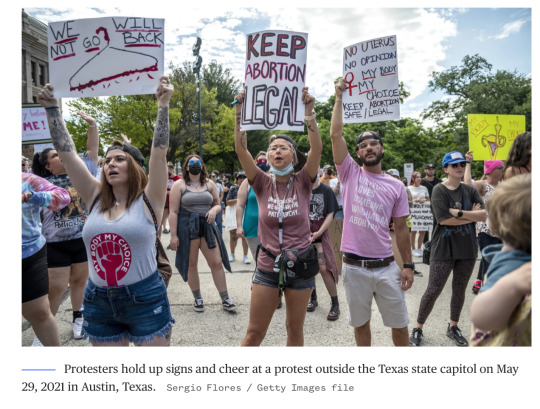
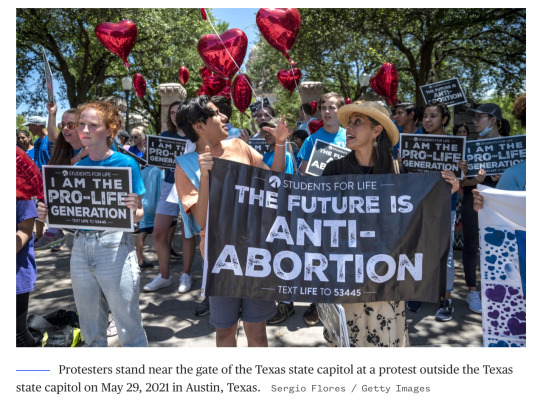
Abortion funds and practical support groups could then become some of the only avenues for millions of women who can't otherwise afford or navigate abortion care on their own. Groups are already looking to lift their fundraising so they can increase services to meet what they say will be an all-but-certain surge in demand.
"Virtually any ruling other than one that upholds Roe is going to result in more people having to travel farther and raise more resources, whether that's paying for procedures or travel costs or lost wages costs,” said the Rev. Katherine Ragsdale, president of the National Abortion Federation. “People are going to be more and more dependent on abortion funds and the groups like NAF who can provide those resources.
The NNAF, for example, launched a pilot program this year for several of its 83 member abortion funds that will "fully resource the mid-Atlantic region so they can say yes to every caller," Hernandez said. The group is trying to double its $15 million budget, Hernandez said, via grants and direct appeals to individual donors.
ARC-Southeast, for its part, has grown its small full-time paid staff of 10 by 40 percent and has expanded its volunteer network of 120 unpaid individuals by a similar amount.
Meanwhile, the National Institute for Reproductive Health and its sister advocacy arm, the NIRH Action Fund, are looking to grow their collective budget by about 30 percent, the groups said.
Groups say they are targeted by new state laws
The Mississippi case and its subsequent fallout, however, are far from the the only battle on the minds of leaders of abortion funds and practical support groups.
A unique Texas law enacted in May banning abortions as early as six weeks into a pregnancy also included language allowing anyone, even someone outside Texas, to sue an abortion provider or anyone else who helped someone get an abortion after the six-week limit for up to $10,000 per defendant. (Texas' law prohibits state officials from enforcing the ban and rather leaves enforcement to private citizens' lawsuits; abortion rights activists have vowed to challenge it.)
But that language would also apply to abortion funds and practical support organizations — and lawsuits would cripple those group's ability to operate at a critical moment, they said.
"It's absolutely a new way for state legislatures trying to find ways to end practical support. It could be a model for states considering how to further crack down on that kind of support,” said Guttmacher's Nash.
That would make it even more difficult for people like Schalit to help women like the 24-year-old patient she assisted last year to travel from Tennessee to New Mexico after nearly every part of the system put up roadblocks for her to receive abortion care.
The woman, Schalit said, discovered she was pregnant at eight weeks and made plans to attempt a medication abortion but lost her job (and her medical benefits) around that time after being laid off due to Covid-19. Her unemployment checks were delayed, and by the time she received her first, the closest possible clinics in Tennessee and Kentucky that provided care were booked up. Soon, she had surpassed the gestational limits in both states, prompting her to seek assistance from the Brigid Alliance.
Schalit personally planned the woman’s travel and hotel and connected her to the New Mexico Religious Coalition for Reproductive Choice, which helped her seek abortion care.
"Her barriers were a combination of everything many women are facing in this world right now in trying to have an abortion, pandemic or no," Schalit said. "It’s a phenomenal story, but it’s also typical. And it’s about to become even more typical."
#Access Reproductive Care-Southeast#National Network of Abortion Funds#National Abortion Federation#Reproductive justice#abortion access#roe v wade#NIRH Action Fund#National Institute for Reproductive Health#New Mexico Religious Coalition for Reproductive Choice
142 notes
·
View notes
Audio
"The Frost is All Over" with every second beat removed
this song was requested by @arachnaetheyarnspider who donated to Access Reproductive Care - Southeast! thanks, arachnaetheyarnspider!
#the frost is all over#the chieftains#arachnaetheyarnspider#every other beat#second beat song#music#every second beat#song#AOfBA#I hadn't heard this song before#but the original scratches my brain in a way that's very nice#something about the rhythm maybe#it's just so nice
70 notes
·
View notes
Text
The National Network of Abortion Funds
The Brigid Alliance
Mississippi Reproductive Freedom Fund
Yellowhammer Fund (Alabama)
Access Reproductive Care Southeast
Fund Texas Choice
New Orleans Abortion Fund
Abortion Care Tennessee
Roe Fund (Oklahoma)
Arkansas Support Network
Kentucky Health Justice Network
Missouri Abortion Fund
Don’t See Your State? Don’t Worry! I promise that they also have abortion funds and networks in place even down to the local level! Even in states where abortion is legal, if it’s not accessible to everyone then it’s not accessible!
#this isn't witchcraft#but it is important#get involved in something#make a real difference in your community
62 notes
·
View notes
Text
TW: ROE V WADE, MENTIONS OF SA.
-
-
-
i remember learning about roe v wade in class. i so hoped and wished that it would not come to fruition, but it did. there is no way i can shake the despair of what it will be like for the women who have been sexually violated, simply cannot afford having a child, or even with the case of just not being ready to have one. there are medical practices that need abortions in order for women to live.
not only does this cut off access to safe abortions, but it opens up violations to our privacy as americans. roe v wade case indirectly is in comparison to interracial couples (plessy v ferguson, brown v board of ed) and lgbtq+ laws on the basis of our right to privacy. our 14th amendment is at stake.

here is an article that gives a proper summary and context of the situation. ive listed some organizations that you can donate to help fund clinics that help women.
abortion access fund (nebraska): link
access reproductive care-southeast (arc southeast): link
center for reproductive rights: link
guttmacher institute: link
ipas: link
indigenous women rising: link
iowa abortion access fund: link
planned parenthood: one | two
national abortion federation: link
national black women's reproductive agenda: link
national network of abortion funds: link
national women's law center: link
naral pro-choice america: link
northwest abortion access fund: link
rape, abuse & incest national network (rainn): link
reclaim mi win fund: link
reproductive freedom fund of new hampshire: link
western pennsylvania fund for choice: link
whole woman's health alliance - stigma relief fund: link

cant donate? sharing helps spread the word!

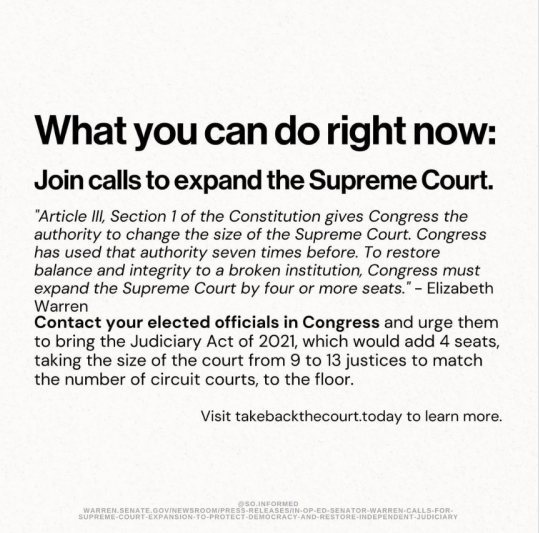
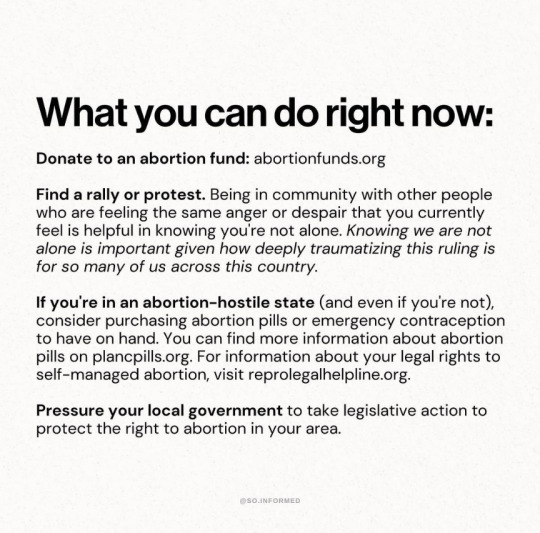
source: @/forwardmidwifery and @/so.informed on instagram.
19 notes
·
View notes
Text
Southern Illinois Abortion Resources - in preparation of Roe v. Wade being overturned
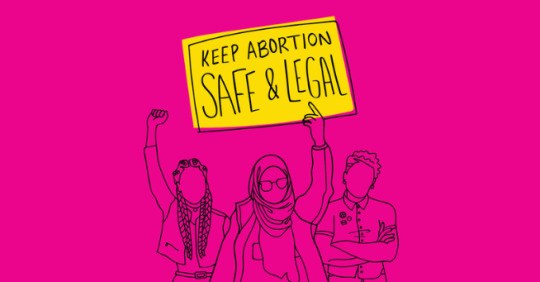
Many of you are aware that the Supreme Court may soon dismantle abortion access, which means that 36 million women (plus many others who can become pregnant) will lose access to safe abortions as nearly 30 states ban reproductive rights - even though 80% of people in America support Roe v. Wade.
According to the Guttmacher Institute, just 15 states protect abortion rights and are expected to become havens where hundreds of thousands will travel in order to access care - Illinois is one of those states. All of Illinois' neighboring states are expected to ban access to safe abortions within the next year, and Southern Illinois will be the closest location to the US South to provide care. Because of this, we at Rainbow Cafe feel it is important to highlight local reproductive health resources and protections.
KNOW YOUR RIGHTS:
ALL people in Illinois have the fundamental right to decide about their reproductive health care, regardless of age, gender identity, gender expression, sexual orientation, sexual behavior, class, immigration status, race, ethnicity, language ability, or disability status. You also have that fundamental right even in State custody, control, or supervision including in jail, prison, or under DCFS custody.
Beginning June 1st, ALL people in Illinois will have the right to keep their abortion completely confidential - including those under age 18. You won't have to notify a parent or legal guardian to access care.
Illinois Medicaid and nearly all health insurance plans are required to cover abortion care.
While medical providers and hospitals may refuse to offer abortions due to religious objections, under Illinois law, they must refer you and offer further information elsewhere on how to obtain care.
Under the Illinois Reproductive Health Act in 2019, anyone is entitled to abortion care at any point or stage within pregnancy - abortions in Illinois may and will be performed after fetus viability if necessary to protect the health or life of the carrier. Under the Reproductive Health Act, any risk (physical or emotional) is grounds to protect one's right to care, regardless of the pregnancy term.
Abortion providers in Illinois are not allowed to enforce any of the terrifying obstacles seen elsewhere - you should never legally be forced to endure waiting periods, view an ultrasound, or listen to misleading lectures prior to accessing care.
RESOURCES:
CHOICES
1203 Poplar Ave, Memphis TN
(901) 274-3550
[email protected]
Originally from Tennessee, CHOICES is a reproductive healthcare clinic planning to move to Carbondale to become the Southernmost provider and ensure a lifeline for those in the Southeast. They also offer more than just reproductive health care - they'll also be providing Southern Illinois and the US South LGBTQ services like HRT and HIV care in the near future. We'll make sure to post more information as their move and expansion into Carbondale continues.
Hope Clinic
1602 21st St, Granite City, IL
(618) 451-5722
[email protected]
The Hope Clinic for Women is just a 10-minute drive east of downtown St. Louis - given its location, Hope Clinic will likely become a haven for our neighbors in the central Midwest without access to care.
Planned Parenthood of Fairview Heights
317 Salem Pl, Fairview Heights, IL
(618) 277-6668
A bit closer to Southern Illinois compared to Hope Clinic, Fairview Height's PP will become the most local branch to provide their comprehensive services - including abortion and contraceptives, STD testing and treatment, LGBTQ services, and general health care.
Planned Parenthood of Springfield
601 Bruns Ln, Springfield, IL
(217) 546-1060
PP also has several locations further north of Southern Illinois, including the Springfield branch. Like nearly all PP locations, they provide a huge range of health care options, in addition to connections within the state capital.
#pro choice#feminism#reproductive freedom#reproductive choice#reproductive health#southern illinois#carbondale#illinois#kentucky#tennessee#missouri#indiana#iowa#roe vs. wade#roe wade#abortion#abortion rights#bodily autonomy#reproductive rights
19 notes
·
View notes